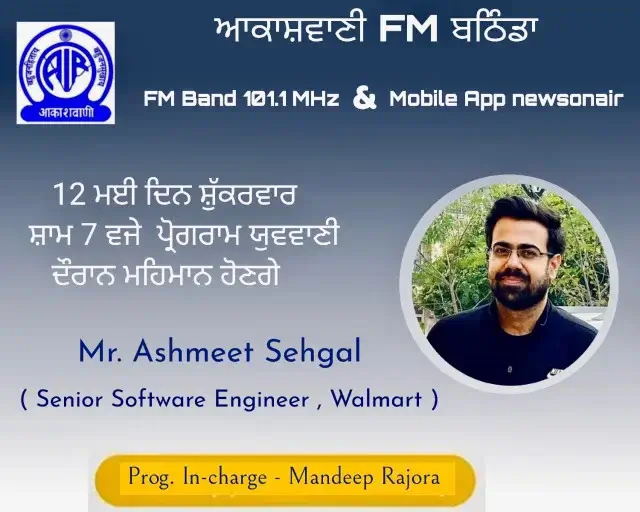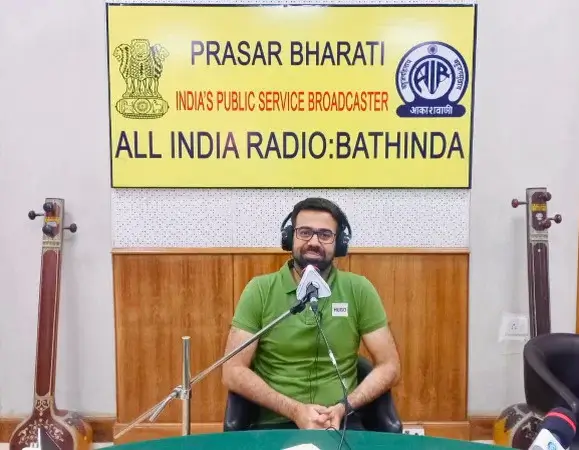As someone who is passionate about technology and software engineering, I got an opportunity to share my knowledge and expertise on a radio interview/podcast. During the interview, I discussed a range of topics related to technology and internet safety, including the pros and cons of depending too much on technology, how to use tech gadgets safely, and how to prevent online frauds.
In particular, I was keen to share my views on the opportunities that exist in India for those interested in pursuing a career in this field, and why we should not always be quick to move abroad in search of better prospects.

How did I get this Opportunity?
I have an online platform/space where young students and professionals who are interested in discussing new opportunities and learning about different technologies can set up some time (1:1) with me and by doing that we come together, share ideas, and learn from one another.
In case you're wondering how can you set up time with me, just click here
So recently one of the students introduced me to the people at All India Radio, which ultimately led to the opportunity to record two programs back to back, one on Technology and the other on Motivation. This highlights the importance of networking and building relationships with others in any field, as it can open up unexpected opportunities and lead to new collaborations.
AIR HQ Experience
Going to the AIR headquarters to record the programs was an exciting experience. Recording for radio can be quite different from other forms of communication, and it requires a unique set of skills to communicate effectively with listeners. And on top of that, I can't prepare much as the program owner (Mr Mandeep Rajora) wanted this as a spontaneous conversation.
See, I am comfortable with mic, stage, and audience however Radio is different. I have conducted several shows as host, tech sessions, took and given several tech interviews. In all above cases, you somehow get the idea about the audience. However, this is not the case with Radio. We can't imagine its reaching and getting an idea about audience.
There might be a housewife, banking professional, farmer, or student listening to your content. So my content should be so easy to understand that anyone from any professional background can understand and get some value out of this program. This whole thing was running through my mind while I was entering the studio.
Interview
We discussed a range of topics including the pros and cons of technology dependence, how to use tech gadgets safely, and the importance of preventing online fraud.

Pros and Cons of Technology
One of the most important points I made was regarding the potential negative impacts of technology dependence. As technology has become an increasingly integral part of our lives, it's important to be aware of its potential drawbacks, such as social isolation and addiction, highlighted the need to use technology in a balanced and responsible manner, emphasizing that technology should enhance our lives, not detract from them.
Safety on Internet
Another key area We addressed was the issue of using tech gadgets safely. With cyber-attacks and online fraud becoming more common, it's essential to understand how to protect oneself online. I provided practical tips for listeners on how to stay safe while using technology, such as avoiding clicking on suspicious links and regularly updating passwords, checking SSL certificates before entering any important data in any application.
Also shared some important internet safety tips to prevent online frauds. One of the key tips I emphasized is the importance of not sharing OTPs (One-Time Passwords) with anyone. Fraudsters often try to trick people into sharing their OTPs in order to gain access to their accounts, so it is important to be extra cautious when receiving such requests.
Also highlighted the fact that older people may be particularly vulnerable to online frauds because they may not be as familiar with technology and may not be aware of the various scams that exist. As a result, I suggested that it might be a good idea to segregate social media and streaming apps from payment apps and to only set up those apps on older people's phones that are required for their use. This will help to minimize the risk of them accidentally falling victim to a fraud or scam.
It is important to educate older people about internet safety and to help them understand the risks associated with online transactions. By taking the time to explain how these scams work and how to stay safe online, we can help to protect older people from becoming victims of online fraud.
I believe that internet safety is an important issue that we all need to take seriously, and glad to have the opportunity to share some of my knowledge and experience on this topic during my radio interview/podcast. By taking some simple precautions, such as not sharing OTPs and being cautious when setting up payment apps on older people's phones, we can all do our part to help prevent online frauds and keep ourselves and our loved ones safe online.
Software Engineering (What, Why, and How)
Also explained what software engineering is and why it's a rewarding career choice. Highlighted the skills required for success in this field, such as problem-solving and creativity, and emphasized the importance of ongoing learning and development. Explaining what software engineering is and the benefits of pursuing it as a career is an excellent way to introduce listeners to a field that may be unfamiliar to them. Discussing the scope of software engineering in India can also help listeners understand the potential opportunities available to them in this field.
India v/s Abroad Opportunities
Finally, I addressed the scope of software engineering in India. We discussed the growing demand for skilled software engineers in the country and highlighted the potential for entrepreneurship and innovation in this field. Also noted that the rapid pace of technological change presents many exciting opportunities for those working in software engineering, and emphasized the importance of staying up-to-date with new technologies and trends.
Moreover, working in India also offers the advantage of being closer to home and family, which can be a major consideration for many people. With the rise of remote work and flexible working arrangements, many software engineers in India can also work for international companies while staying in India.
I emphasized that while there may be opportunities available abroad, it's important not to overlook the exciting opportunities available in India. With a rapidly growing tech industry, a large pool of talented software engineers, and the advantages of working close to home and family, India has plenty to offer those working in software engineering. By staying informed about the latest trends and technologies, and developing their skills and experience, software engineers in India can build rewarding and successful careers in this exciting field.
In Nutshell
Overall, My first-time radio interview/podcast experience was a success. I was able to share my expertise clearly and engagingly. I believe that my past experiences as a host, tech session speaker, and interviewee have prepared me well for recording for radio and my experience of being approached by AIR and recording two programs on technology is a great example of the power of networking.
The fact that AIR has decided to air two of my programs is a testament to the value of my work and the quality of the content that I was able to produce. It's a great opportunity to reach a wider audience and share my insights on technology and software engineering with a broader group of people.
In the end, demonstrated a deep understanding of technology and software engineering and was able to communicate complex ideas in a clear and accessible manner. By highlighting the potential benefits and drawbacks of technology, providing practical tips for staying safe online, and discussing the potential for a rewarding career in software engineering, and was able to provide valuable insights and advice for our listeners.
FAQ's
1. How did Ashmeet Sehgal get the opportunity to be interviewed on All India Radio?
Ashmeet Sehgal was given the opportunity to be interviewed on All India Radio after being introduced to the producers by a student who participates in his online mentoring programme. This highlights the importance of networking and fostering relationships within a field to unlock new opportunities.
2. What was Ashmeet's experience like at the All India Radio headquarters?
Ashmeet found his visit to the All India Radio headquarters exciting, yet daunting. He was accustomed to public speaking and interviews, but the radio format presented unique challenges. Without visual cues from the audience, he had to consider a wider range of listeners and adapt his communication style accordingly.
3. What were some of the main topics discussed in the interview?
The interview covered a range of topics, including:
The Pros and Cons of Technology Dependence: Examining both the benefits and potential negative impacts, such as social isolation and addiction, emphasizing the importance of balanced and responsible technology use.
Internet Safety: Providing practical tips on protecting oneself online, such as avoiding suspicious links, regularly updating passwords, and checking SSL certificates. Preventing Online Fraud: Highlighting the importance of not sharing OTPs (One-Time Passwords) and educating older people, who may be more vulnerable, about online scams and safety measures.
Software Engineering as a Career: Explaining what software engineering entails, the skills required, and the rewarding career opportunities available in India.
Opportunities in India vs. Abroad: Emphasizing the growing demand for skilled software engineers in India, the potential for entrepreneurship and innovation, and the benefits of working closer to home.
4. What advice did Ashmeet give regarding internet safety and preventing online fraud?
Ashmeet emphasized the importance of being cautious online, especially regarding sharing personal information. He advised listeners to avoid clicking on suspicious links, regularly update passwords, and check SSL certificates before entering sensitive data. He stressed the importance of never sharing OTPs and educated listeners about common online scams.
5. What did Ashmeet say about the scope of software engineering in India?
Ashmeet highlighted the burgeoning tech industry in India, which is creating a high demand for skilled software engineers. He encouraged listeners to consider the potential for entrepreneurship and innovation within the field and emphasized the exciting opportunities available without having to move abroad.
6. Why did Ashmeet recommend considering a career in software engineering?
Ashmeet presented software engineering as a rewarding career choice due to its problem-solving nature and the creative opportunities it offers. He emphasized the importance of continuous learning and development to stay ahead of technological advancements, making it a constantly evolving and stimulating field.
7. What were Ashmeet's takeaways from his first radio interview?
Ashmeet found the experience to be both successful and rewarding. He was able to effectively share his knowledge and engage listeners through the radio format. He also recognized the power of networking and was grateful for the opportunity to reach a broader audience with his insights on technology and software engineering.
8. What message did Ashmeet aim to convey to listeners?
Ashmeet aimed to educate listeners about the opportunities and challenges presented by technology. He encouraged them to use technology responsibly, prioritize internet safety, and consider the rewarding career paths available in fields like software engineering, especially within India's growing tech industry.

